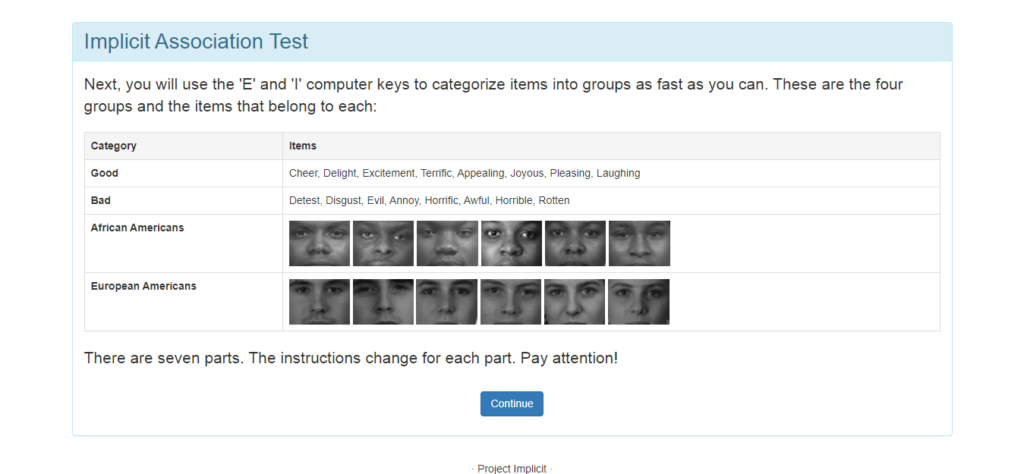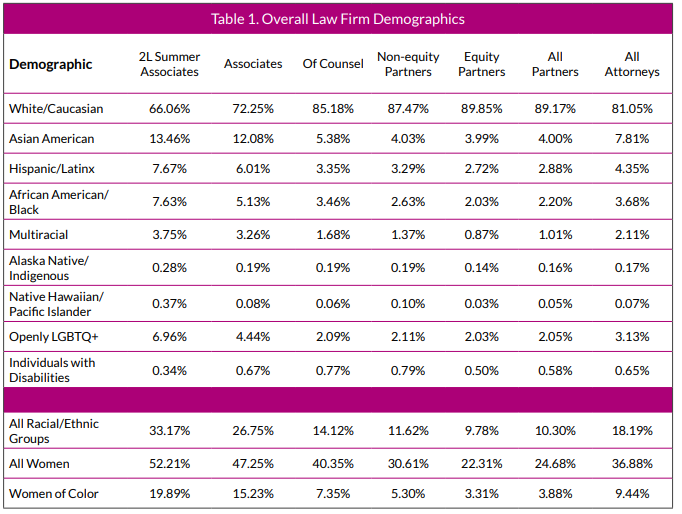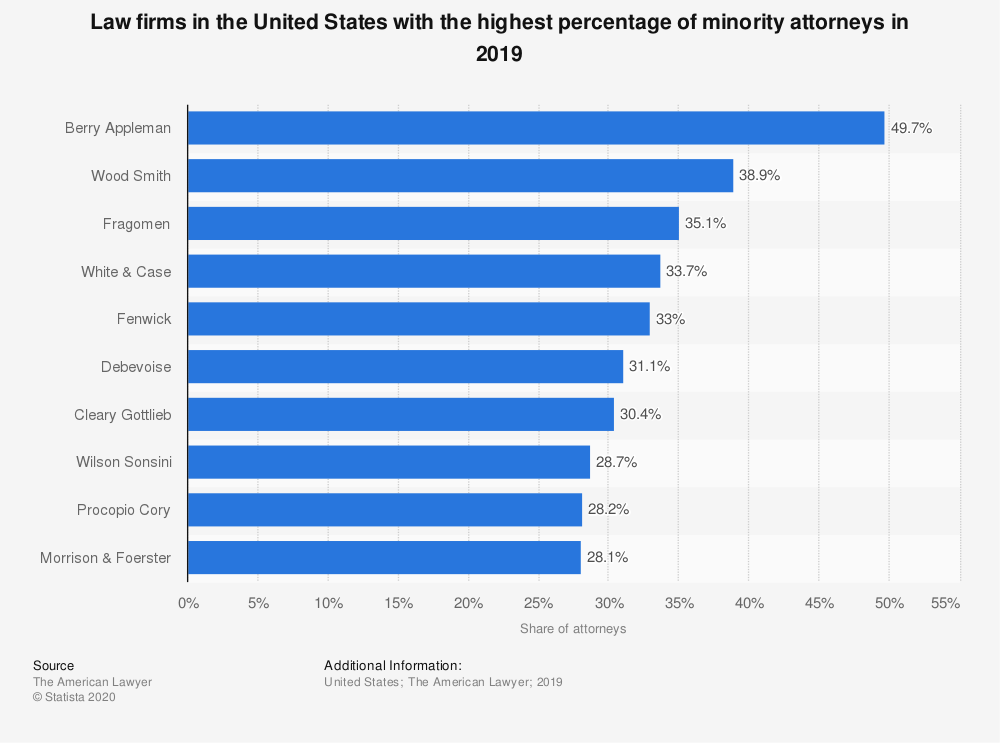Diversity in law shouldn’t start and end at hiring: Here are 4 ways to do more

Diversity is often viewed as a social responsibility that makes the world a better place, but businesses that see it as little more than a mechanism for performative progress are missing out. An ongoing McKinsey study proves workplace diversity is a force for innovation and increased profitability for businesses. More recently, McKinsey found that “diverse companies are more likely to financially outperform their peers” by up to 36%.
And while more law firms and in-house legal teams are starting to prioritize DEI by hiring more diverse candidates, an excerpt on Racism — and even the American Bar Association — recently described the legal profession as the “least diverse of any profession.” One glaring example is the case of Asian American lawyers who represent more than 10% of graduates in top law schools yet remain the least likely group to be promoted to management in the United States, according to Harvard Business Review.
Diversity in law shouldn’t start and end at hiring. In addition to job opportunities, it’s important to create inclusive policies and environments for marginalized legal professionals so they can thrive in the legal industry and contribute to innovation, profitability, and growth. Here are some steps you can take.
1. Educate your employees against bias
Educate your employees against bias so that no one takes actions — purposefully or not — based on preconceived perceptions, stereotypes, and personal prejudices of a race or gender. Those actions are often unwise, unfair, or both.
For example, according to research by Yale Law School, there’s a harmful misconception that Asian Americans are hardworking and logical but not empathetic, creative, or assertive. Misconceptions like these can cause less creative work to be continually assigned to legal professionals who would otherwise excel — just like the rest of their peers — at other tasks when given the opportunity.
To effectively educate against bias, establish training resources that:
- Point to the business case for diversity and inclusion — Self-interest is a big motivator for action, so when people at your workplace understand everyone — not only underrepresented legal professionals — benefits from DEI efforts, they are more likely to cooperate. A good business case to point to for diversity and inclusion is the financial performance of diverse companies. As stated earlier, McKinsey reports that “Diverse companies are more likely to financially outperform their peers.” More business profits translate to better job security and maybe even cash bonuses for team members.
- Paint clear pictures of what bias looks like — Most biases are implicit, incompatible with our conscious values yet caused and influenced by the society we live in against our own conscious awareness. You need to show examples of what bias looks like to draw people’s attention to unconscious bias. Preferring one race over another is an example. You could recommend people take the Implicit Association Test by Harvard University — a visual implicit bias game test played on a computer — to uncover their implicit bias.

Finally, hold people accountable for their behaviors. Studies show when people expect to explain their actions, they tend to make less biased decisions. Therefore office policy should include wording that explains the consequences of discrimination.
2. Mentor minority law students and juniors
You need to make an effort to mentor underrepresented law students and juniors because research shows they continue to be excluded from mentoring programs.
Minority law school enrollment rates have dropped in recent years. According to American Bar Foundation research, fewer Asian Americans and Black Americans have enrolled in law school since 2010. Given that you can’t have a diverse team without minority lawyers in the first place, this is a problem that needs immediate attention.
- Make provision for internships for underrepresented students — According to Forbes, 43% of students who snag internship interviews land those interviews through family connections, connections marginalized students don’t often have.
- Pay minority students for internships — Many minority students are low-income and cannot afford to take unpaid internships. If paid internships are unavailable to them, they’ll work other jobs that pay but don’t necessarily help with career development.
- Open your professional network to marginalized legal professionals — Studies show that white males are most likely to be mentored, have connections between their fraternities, social clubs, parents connections, and the better schools they go to means better recognition in their careers. Whereas a study by Yale Law School and the National Asian Pacific American Bar Association revealed many Asian American lawyers complained about having inadequate access to mentors and contacts in their careers.
When you include minority students and legal professionals in mentoring efforts, they will have most of the resources they need to thrive in the legal profession. When young bright marginalized students and lawyers see people like them thriving in the legal profession, they may be encouraged to pursue a legal career too.
3. Don’t leave candidate selection to AI that may discriminate
An HBR report found that instead of helping hiring managers overcome their personal prejudices, “hiring algorithms will drift toward bias by default.”
“They can replicate institutional and historical biases, amplifying disadvantages lurking in data points like university attendance or performance evaluation scores,” writes Miranda Bogen of HBR.
Ad platform algorithms can also exhibit bias. Before you even start getting applications, ad platforms like Facebook or LinkedIn may limit your pool of candidates by showing your job ad to groups of people the algorithm deems most suitable —instead of everyone you want to reach. This indicates minority candidates may be excluded from the hiring process before you even get to filtering candidates.
Correctly shape the candidate pool by listing your job ads on job platforms like Jopwell, which gives you access to a community of diverse candidates: Black, Native American, Latinx students, and professionals.
Also, use tech tools like Textio— an augmented writing tool for recruitment teams — to ensure your job postings are free of bias language that may repel marginalized candidates.
4. Enforce billing guidelines that cater to DEI for your vendors
Enforce billing guidelines that cater to diversity and inclusion for your vendors to encourage them to actively think about and implement DEI. That way, you can positively affect industry-wide change one vendor at a time.
A 2020 Vault/MCCA Law Firm Diversity Survey found that only 26% of firms are Mansfield certified, i.e. only 26% of firms have minority lawyers making up 30% or more of their team.

When you establish requirements and programs that keep your law firms accountable, they are more likely to actively invest in diversity efforts.
You could implement a billing guideline that requires law firms to improve diversity or take a fee cut like Coca-Cola’s General Counsel did. Alternatively, you could offer a small diversity bonus instead.
Also, consider simply using some of the more diverse firms.

You can use legal technology like SimpleLegal to enforce billing guidelines and also to track and analyze your outside counsel’s diversity data without collecting personally identifiable information (PII).
Diversity in law is a collective and ongoing effort
From how you educate your team to the opportunities you provide for underrepresented candidate groups, everything you do has a role to play in making the legal profession more diverse. Consider how you’ve been recruiting candidates and empowering them but don’t fail to hold your vendors accountable too. If you aren’t tracking how diverse your vendors are already, here are two things you can do to track your outside law firm diversity.

